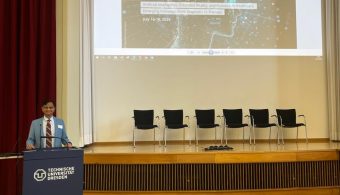Photo Source: Pexels.com
NetApp’s Cloud Complexity Report Unveils India as AI Leader Amidst Global Divide

Article:
Intelligent data infrastructure company NetApp has released its second annual Cloud Complexity Report projecting India as a leader in the global implementation of AI projects.
In its second annual cloud complexity report, NetApp delves into the landscape of AI deployment among global technology decision-makers, showcasing a distinctive gap between leaders and laggards.
The report also underscores the pivotal role of unified data infrastructure in the realm of AI success.
India Emerges as AI Vanguard
The report sheds light on India’s trailblazing advancements in AI adoption, with a staggering 70% of its companies actively engaged in AI projects, far surpassing the global average of 49%.
Moreover, an overwhelming 91% of Indian firms are poised to leverage at least half of their data for AI model training by 2024.
Puneet Gupta, Vice President & Managing Director of NetApp India/SAARC, highlighted the strategic significance of India’s data prowess in fostering AI innovation. Gupta remarked, “The world today is driven by AI, and data plays a critical role in enhancing AI capabilities. India is a country of humongous data sets. No surprise then, that India leads the world, and corporations are embracing AI to further their IT agenda.”
Clear Disparities Between AI Leaders and Laggards
The findings delineate a palpable division across regions, industries, and company sizes, underscoring the disparities between AI leaders and laggards:
- Regions: 60% of AI-leading countries (India, Singapore, the UK, and the USA) have AI projects up and running or in pilot, in stark contrast to 36% in AI-lagging countries (Spain, Australia/New Zealand, Germany, and Japan).
- Industries: While the technology sector leads the pack with 70% of AI projects up and running or in pilot, healthcare and media & entertainment sectors lag behind, with 38% and 25% of AI projects, respectively.
- Company Size: Larger enterprises demonstrate a higher propensity for AI project execution, with 62% reporting projects up and running or in pilot, versus 36% of smaller companies.
Divergent Approaches to AI Adoption
Globally, AI-leading countries exhibit a more robust infrastructure readiness for AI deployment, with 67% of companies in these nations reporting having hybrid IT environments.
India leads in this aspect with 70%, while Japan lags behind at 24%. Additionally, 87% of Indian companies have optimized IT environments for AI, with some AI-lagging countries also showing progress: Germany (67%) and Spain (59%).
AI leaders also report benefits from AI, including a 50% increase in production rates, 46% in the automation of routine activities, and a 45% improvement in customer experience, as noted by Gabie Boko, Chief Marketing Officer at NetApp.
Boko remarked, “The rise of AI is ushering in a new disrupt-or-die era. Data-ready enterprises that connect and unify broad structured and unstructured data sets into an intelligent data infrastructure are best positioned to win in the age of AI.”
AI Laggards Must Swiftly Innovate to Stay Competitive
Despite the divide, there is notable progress among AI laggards in preparing their IT environments for AI, but the window to catch up is closing rapidly. A significant number of companies in AI-lagging countries (42%) have optimized their IT environments for AI, including Germany (67%) and Spain (59%).
These countries also report benefits of a unified data infrastructure in place, such as easier data sharing (Spain 45%, Australia/New Zealand 43%, Germany 44%) and increased visibility (Spain 54%, Germany 46%).
The NetApp reiterates India’s position at the forefront of AI and cloud innovation with a 70% adoption rate, and around 94% of India-based companies actively automating their Cloud Operations, as per the report.
NetApp’s report also underscores the evolving dynamics of AI deployment worldwide, urging stakeholders to navigate the complexities with agility and innovation to unlock the transformative potential of AI.


